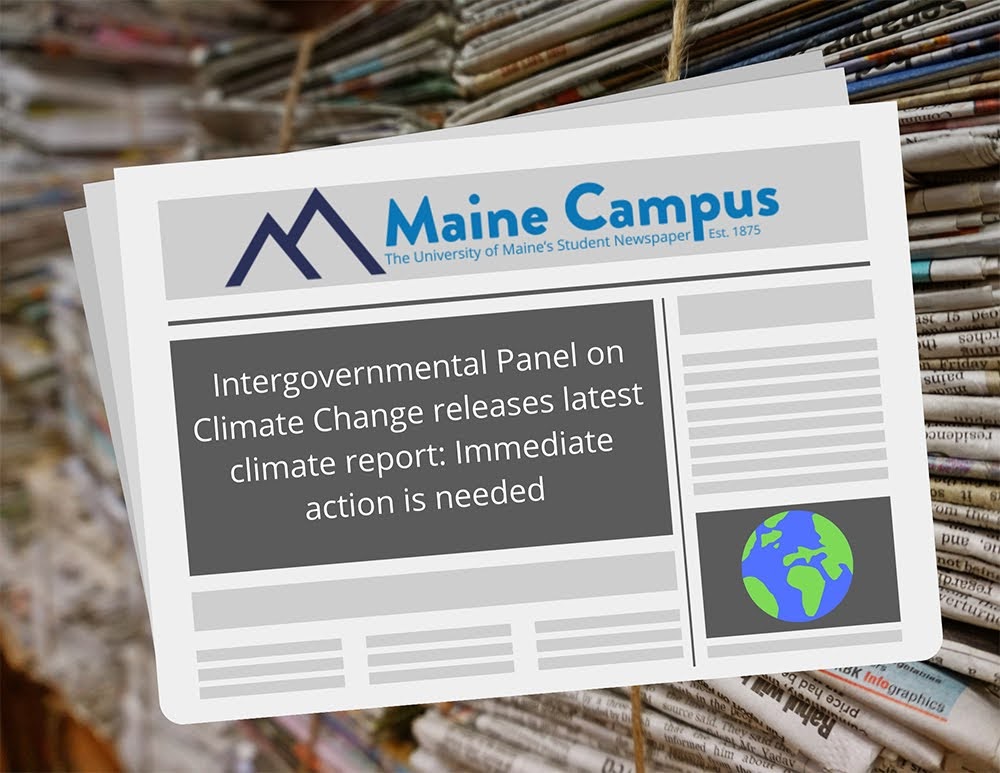The window of time to mitigate the current impacts of climate change is slowly coming to a close. Last month, the Intergovernmental Panel on Climate Change (IPCC) released its sixth report assessing the consequences of climate change on ecosystems, human communities and biodiversity while considering the limitations and vulnerabilities of the natural world. The report tracks the decrease of certain species in equatorial and tropical regions, the altered biodiversity across the globe and the impact that anthropogenic climate change has on human health, especially that of Indigenous groups. Despite the overwhelming evidence that climate action needs to happen, the University of Maine Board of Trustees won’t divest $14 million in oil, coal and gas companies.
Researchers for the IPCC found that the increase in extreme weather conditions “have exposed millions of people to acute food insecurity and reduced water security,” especially in Africa, South America, Central America and Asia. Those most affected by the sudden decrease in food production and food diversity are “Indigenous Peoples, small-scale food producers and low-income households with children, elderly people and pregnant women.” Impacts on health extend to the economic and social well-being of citizens. Evidence has shown that climate change impacts infrastructure, such as transportation, water and sanitation. Coastal, freshwater and marine ecosystems will see a great loss in biodiversity if global temperatures rise 1.5 degrees Celsius. Climate change is no longer a far-away danger; it is in our backyard, and we need to take responsibility as a community to do the most we can.
National Public Radio recently reported that the Gulf of Maine experienced record-breaking temperatures in 2021. Melting ice from the Arctic causes water temperatures to increase in the Gulf, and its effects are already being seen by researchers and fishermen alike.
“Warmer waters are bringing in more southerly species,” one fisherman said to NPR.
Since the Gulf of Maine warms nearly three times faster than any other ocean, many look toward the waters of Maine as a reflection of what will happen to other marine ecosystems and coastal industries around the globe. The changes we are witnessing in Maine reflect the inevitable changes to our economy, lifestyle and way of life.
A Portland Press Herald article from September 2021 documents the university investment policy change that occurred in 2016 that took Environmental, Social and Governance (ESG) principles into account. While there has been a 70% decrease in fossil fuel investments in the university endowment, there has been little discussion to divest the remaining percentage. Last June, Maine became the first state to sign into legislation the commitment to sell off or divest their investments in fossil fuels. One must question why the university has not taken the same steps. By funding the exploitation of the environment through fossil fuels, UMaine becomes complicit in the cycle of environmental degradation and the people it affects.
Climate change disproportionately affects people of color. According to Greenaction, poorer communities, often consisting of people of color, frequently live on undesirable lands that are more susceptible to extreme weather, near hazardous waste and are generally more polluted. No true climate justice can occur without some form of racial justice; divestment from fossil fuels equals reinvestment into the people and places that it harms most.
While the Board of Trustees needs to invest in renewable energy and our future, students need to be aware of and investigate where their money is going. By having the knowledge of where tuition, donation dollars and other funds go, we can proactively advocate having the money divested from fossil fuels and hold the Board of Trustees accountable. College students can also keep up with climate news and discuss the relevance and importance of the university as a model for other major institutions in the fight against climate change.




